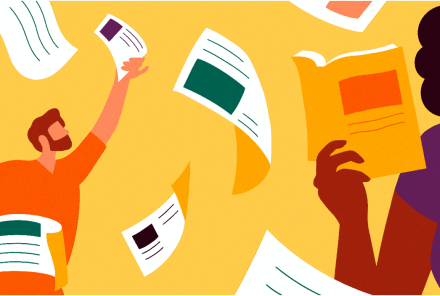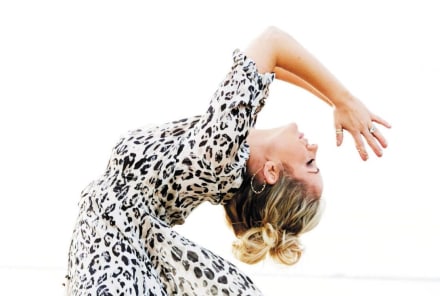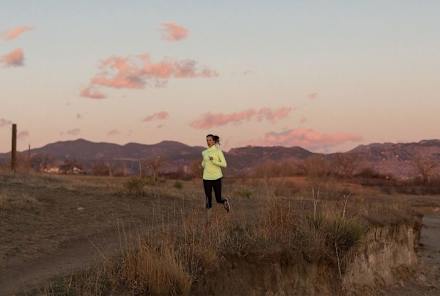Advertisement

The problem with panic attacks isn't the sheer terror you experience when you're caught up in one, nor is it the ensuing fatigue. It's how preoccupied you are before having to face that same situation again. Perhaps it's taking the train or plane, or speaking at a meeting—the thought of the situation alone makes your shoulders seize, and you have sleepless nights because the same circuits get activated in the brain simply by thinking about it.
I know this intimately because panic attacks used to be my dirty little secret, and I believed I'd have to manage them for the rest of my life.
But as a clinical psychologist, one of my specializations today is treating panic attacks. If you believe they're a lifelong affliction, here are a few small but powerful steps that can start you down the path to healing—because it does exist:
1. Remember: There is no shame in making yourself comfortable.
In psychology, the term "safety behaviors" refers to the things we do that we believe help us cope with panic attacks but actually cause them to persist. For instance, we may believe, "If I don't bring water or a book to distract myself, I'll have a panic attack on this train." So we'll continue to indulge in these safety behaviors to protect ourselves, thinking we need them to cope with the stressful situation. As a typical treatment method, therefore, we're encouraged to let go of these alleged crutches.
But what if the train is legitimately stuffy because the heaters are switched on during a boiling summer, and there's no ventilation? Does that mean we should adamantly not bring water? As I tell my clients, look around—in any hot situation, it's common sense to carry water and not judge yourself for removing layers of clothes. Similarly, if you're taking an airline where the air conditioner only turns on after takeoff, it's no big deal to ask the crew for a glass of iced water.
You don't always need to "try to be courageous" when looking to overcome panic. You may have always read to distract yourself in vehicles long before your first panic attack. Why judge yourself for that? We all want to keep ourselves feeling comfortable. It's important to learn what's reasonable behavior and not be too unnecessarily hard on ourselves. It comes down to just being mindful: Are your needs based on fear or practical concerns?
2. Know that panic attacks don't make you less of a person.
Most of my clients imagine "mental illness" to mean they'll need to be in a psychiatric ward because of mild anxiety, and that terror itself makes everything worse. I knew that terror personally: My first panic attack happened as I began my career as a psychologist. Much as I'd tell my clients there's no shame in experiencing panic or in having a mental illness—and I believed that—a part of me sided with the societal stigma. As a Type A perfectionist, I expect more from myself than from others, and like anyone who keeps hearing the negative ways other people can view those of us with anxiety, I feared being seen as less than a person. But I started to realize I was inflicting that stigma on myself with my own thoughts.
We must learn to reframe anxiety as a mental health difficulty and to accept that it's OK to struggle with our mental fitness on some days more than others. That way, it doesn't become wrapped up with how we see ourselves, and we can stop feeling ashamed of who we are.
3. Return to your body.
The tornado of catastrophic thoughts during a panic attack is soul-crushingly debilitating. And they seem logical—I'm having a heart attack if your heart is palpitating and your chest is aching, or people are laughing at me because when we feel vulnerable, we imagine the spotlight is thrust upon us. This is followed by self-critique, like stop being so stupid, just get over it, and be logical. Self-castigation adds a veneer of shame and pressure to find the mythological "Stop This Panic Attack Right Now" button.
Being lost in our heads means we don't make wise decisions. Instead, we need to refocus our attention on our physical sensations. The simplest way to return to your body is to shuffle your feet on the ground, just as animals do. As we feel the points of contact between our soles and the floor, we get grounded. We slow down. We stop being caught up in our thoughts. That's when we realize we aren't having a heart attack and that people aren't laughing—they probably haven't noticed a thing.
When that mindset shift happens, you can ask yourself, "So what can I do right now to take care of myself?" Perhaps, it's getting some fresh air or having a soothing cup of tea.
4. Don't be disheartened if you try a supposed "healing" method that doesn't work.
We love the idea of a quick miracle fix. I get this—I'd have paid any amount for a pill or a dietary change so I'd never freak out on a train again. I explored the different popular solutions—from spiritual energy clearing to nutritional options—that claimed to "get rid of panic attacks for good" for those who said they'd tried, failed, and thought themselves "incurable." But I realized many of these methods weren't actually targeting panic attacks. They were designed around anxiety: When your head is bogged down by catastrophic thoughts, and you're paralyzed into inaction. It can be physically exhausting indeed—but although they're related, having anxiety is not the same as having a panic attack.
A panic attack is physically debilitating. It's when you feel your head or heart is about to explode, the prickly heat at the back of your neck is coursing through your entire body, and your breathing becomes so shallow that you have zero doubt that something tragic is going to happen to you. You'll do anything to escape the situation you're in—for respite in the form of fresh air, water, or space. A panic attack feels like an alien has possessed your body.
While tweaking our nutrition and energy can be immensely helpful for our gut and mind, healing from panic attacks involves knowing intimately that the old triggering context is safe. That we can deal. It involves being able to eventually walk into that same context and think nothing about it. Moreover, for many of us, our minds need closure—to understand why we started having panic attacks in the first place. Otherwise we find ourselves in similar situations years later, and they have a reprisal. That's why panic treatment looks different from broader anxiety treatment; pinpointing the root cause and thoughts associated with your panic attacks is key.
5. Find your supporters.
"After five years in my job, I told my manager the truth because I was breaking down," one client once told me. "I thought he'd fire me, but he told me to see you."
This person, like my old self, feared telling others. Yes, you'll run into some people who may mock you or tell you to just "mindset" it away. Some people may lack understanding for various reasons, but there will be many who will have your back. Anxiety is one of the most common mental health difficulties we face, and panic attacks are one of its manifestations. People are growing increasingly aware and understand the need to tackle them. Find the people who are willing to step up and support you; drop those who aren't.
6. See improvements as up-leveling.
A simple way to reframe Project: Heal Panic Attacks is to see it as a game, where you advance in levels. Many mistakenly believe that they need to "get over all the symptoms" immediately when tackling this, and I explain that our panic attacks didn't get so bad overnight. An hour of work is merely the beginning. This mindset shift helps many to go easier on themselves. And so we'll draw up different levels of challenges to work on—initially your fear level may be 11/10, and as you "level up," it'll drop to 3 and then eventually to 0. Feeling that sense of accomplishment as you level up provides a much-needed dopamine boost in your brain that makes you want to keep forging forward.
7. Accept that sometimes you'll slip.
Two years after my final panic attack, I felt that familiar heart palpitation. "Oh god, are they back?" I wondered.
As I paused, I had a few realizations. First, it was an extremely stuffy train, and I was wearing multiple layers of cashmere. Second, it was a particularly stressful time in my life. So I told myself, "Even if they return, I know how to deal. I won't judge myself."
I got to my destination; the ride was more pleasant than I'd catastrophized. The next train I took raised my pulse by a little more than normal, but it was minor. I realized I'd conquered it.
I tell this story because life happens. We'll feel we're slipping back. When working on healing panic attacks, there's inevitably a week or two when my clients despondently declare they're "back at square one" because life can get stressful or that week's homework was a little more challenging. And that's precisely how the process works—we have to experience what it feels like to slip back and to know we have the resources to master this. When that happens, we know we can conquer any situation.
Just because there's a Band-Aid doesn't mean you'll live your life that way forever.
A big problem with dealing with panic attacks is that when caught in the terror, we're desperate for anything to take the pain away. But when it's over, we tell ourselves we won't have to work on it and will simply deal when it hits next. Oscillating between desperation and denial merely increases our sense of helplessness. What worsens it all is how we're also told that panic attacks—like anxiety—are simply things we have to learn to cope with all our lives. But really, coping is passé—it's like those "coping with stress" and "time management" seminars that only add to our to-do list and paradoxically cost us more time and stress.
Here's what you need to know about healing from panic attacks, to debunk the myths we're told:
- You can live a life free of panic attacks. That should be your expectation, not simply learning another breathing method to "cope" with them.
- You don't need to sit on a therapist's couch for years without improvements—in fact, most of my clients FaceTime with me as I get them back on trains and planes in as little as three weeks, despite decades of avoiding them.
- People with panic attacks often have anxiety and believe their head is in control. Actually, you can be the master of your mind and make it work for you instead.
Panic attacks shrink our lives and how we see ourselves. They take away our freedom, no matter how we justify that we can live with that. Yes, we can learn to tolerate anything in our lives, but imagine what it would be like to stop being at the mercy of panic attacks and to instead really, truly be able to live your fullest life.
It is your right to heal from panic attacks. You can choose life instead.
Watch Next
Enjoy some of our favorite clips from classes
Enjoy some of our favorite clips from classes
What Is Meditation?
Mindfulness/Spirituality | Light Watkins
Box Breathing
Mindfulness/Spirituality | Gwen Dittmar
What Breathwork Can Address
Mindfulness/Spirituality | Gwen Dittmar
The 8 Limbs of Yoga - What is Asana?
Yoga | Caley Alyssa
Two Standing Postures to Open Up Tight Hips
Yoga | Caley Alyssa
How Plants Can Optimize Athletic Performance
Nutrition | Rich Roll
What to Eat Before a Workout
Nutrition | Rich Roll
How Ayurveda Helps Us Navigate Modern Life
Nutrition | Sahara Rose
Messages About Love & Relationships
Love & Relationships | Esther Perel
Love Languages
Love & Relationships | Esther Perel


















